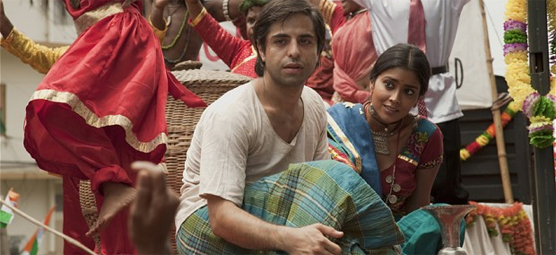The adaptation of Salman Rushdie’s Midnight’s Children (directed by Deepa Mehta with a screenplay by the novelist himself), is a lush, sprawling, magical parable. It calls to mind other examples of nation-defining filmmaking, like Italy’s The Best of Youth or Germany’s The Tin Drum, in that it follows a story through generations, crafting an allegory that locates something of the development of a national identity in the lives of citizens caught in a tumultuous historical moment. Too bad Midnight’s Children isn’t half the film those other two examples are.
In the movie, we begin with the story of a doctor in future Pakistan who meets his wife, who is a patient, and has three daughters with her. Then each daughter finds a spouse. One of these daughters is the mother of the film’s narrator and film’s main character, Saleem Sinai (Satya Bhabha). Saleem’s own origins are peculiar. His mother falls in love with the poet secretary of a provincial leader who is assassinated by Pakistani rebels. He takes refuge in the doctor’s basement, and the daughter falls in love, marries him in secret, but the young man cannot (physically) consummate the marriage. This infuriates Saleem’s mother’s sister, who rats-out the stowaway to her own love interest, a local army officer. The groom escapes and disappears, and Saleem’s mother ends up remarrying a wealthy businessman.
As you might have guessed form all this love complication, Midnight’s Children is a film about origins. All of this soap-operatic intrigue is meant to set up allegorical parallels with a nation turned in on itself. The plot thickens when Saleem’s own birth – precisely at midnight on the night the British hand rule over to India in 1947 – is confused by a nurse who, inspired by her Marxist boyfriend, switches the baby of a rich family and the child of a poor family in an impulsive moment of social revolt. That sets up the story’s main crux, that confused origins undercut our assumptions about social status, national identity, familial love, and fate.
Midnight’s Children cuts down Rushdie’s novel, but it is still a sprawling, luxuriant movie. It is at times visually stirring, with Mehta managing to fill with the screen with richness and color. But it is also rudimentary, a film that loses the narrative texture of the novel. There is so much plot here – so many twists and turns, magical interruptions, and monumental historical melodrama – that you can hardly imagine how an adaptation of Midnight’s Children could fit in anything but storyline. What there is no room for, unfortunately, is humanity, depth to the character’s personal dramas.






